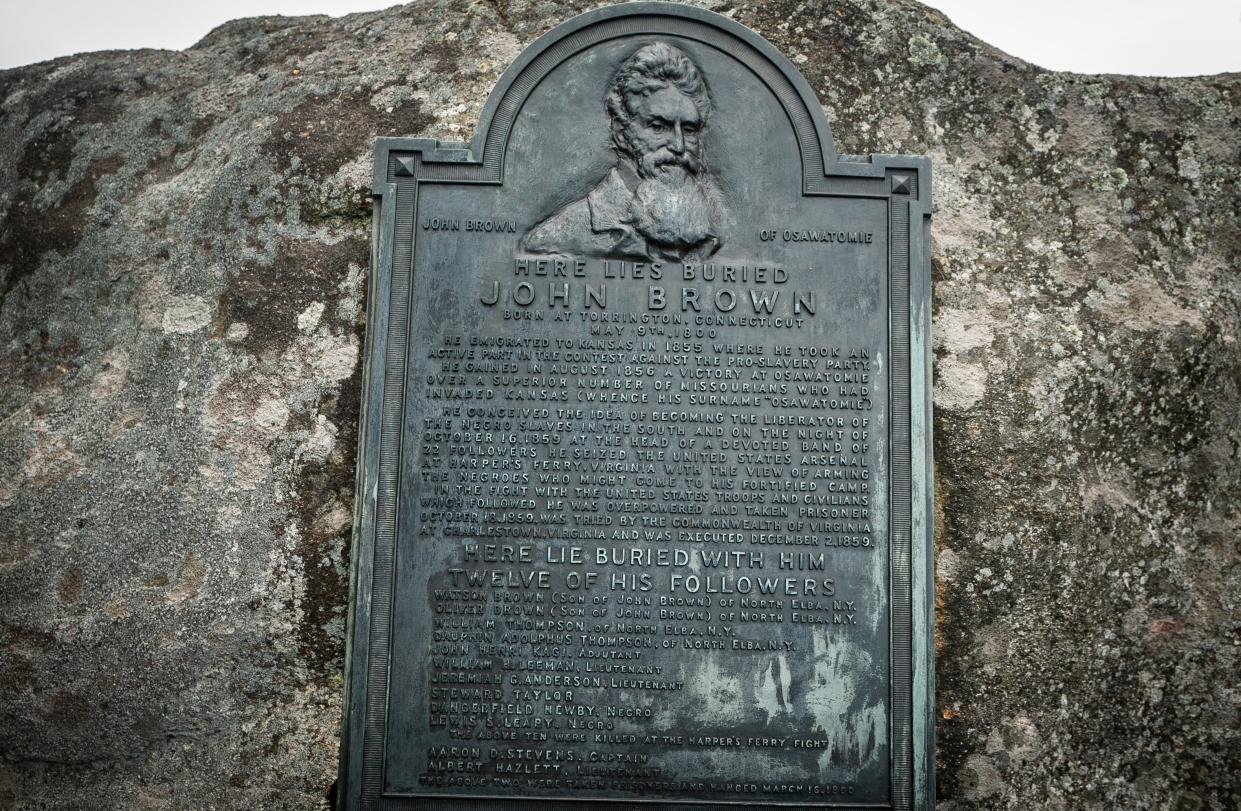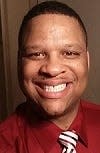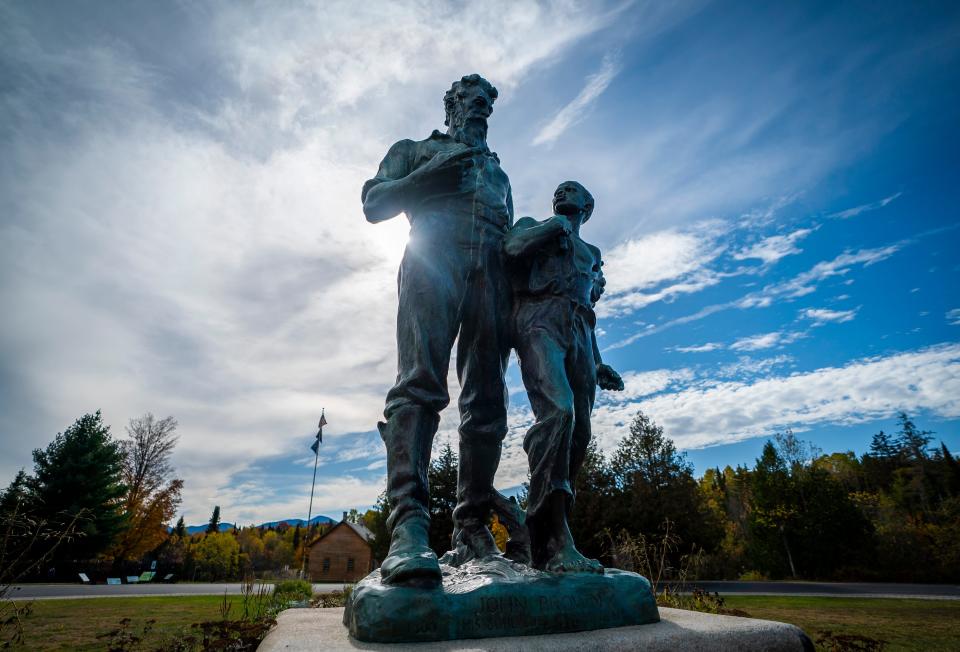Davis: My granddad, and how he put the hero John Brown on my mind

- Oops!Something went wrong.Please try again later.
I grew up on Fort Bragg, but I was born in small-town Albemarle.
While my military community was very diverse, my hometown was not. My hometown was a post-Brown v. Board of Education America in which the U.S. Supreme Court ruled that separate but equal was not Constitutional. Yet as a child, I was told not to find myself past the railroad tracks after dark in my hometown, because the town still practiced segregation — and that was the line. And everyone there knew it.
More: Daron Davis: Fighting voter suppression in North Carolina, one person at a time
This was vastly different from my military community, so I noticed that contrast. And this is where, from my own personal experiences, I learned some Black Southern Rural Culture.

I want to tell you about my paternal grandfather. My Granddad, Charles Everette Davis, 81, died on March 5, 2011. He was loved and is missed daily by his friends and family.
More: Daron Davis: What is a lynching? Are we still seeing them today?
My grandfather rarely used curse words. He grew up as a Christian and was taught that using the Lord’s name in vain is a sin. What he would do instead was replace curse words with terms that are not offensive.
We are all familiar with switching words or code-switching. We all have heard folks say “darn” instead of the swear word we all know. They interject, “Shoot!” when we all know what word they're replacing. Maybe it's out of being polite, or it could be location-based, like a school or church. It could even be religion-based, but no matter, we are all familiar with this type of code-switching.
My grandfather would replace the blasphemous G. D. (“Gosh Darnit”) with “John Brown.” For example, if his knees hurt, he might say, “My John Brown knees are killing me.” He would also use John Brown as an exclamation, as in: “That's John Brown, right!”
More: Beto O'Rourke in the news: How Critical Race Theory gets weaponized
I was a child. I had no idea who John Brown was. But since that time, I have discovered who John Brown was. I learned that he was a hero. And as an adult, I realized that heroes always had enemies. I also came to understand that the heroes’ enemies are the real villains. So, John Brown was a hero, but John Brown was also a villain to pro-slavery people.
The question has always been: “Was the abolitionist, John Brown, a white American man, a hero, a villain, a madman or a saint?” Left with these four choices, I most definitely consider him a hero. He was a righteous freedom fighter and fought against the evils of slavery.
After many years of using words, logic and biblical references, he realized that slavery would never end without bloodshed. His conclusion, in retrospect, was correct. He was prolific in his vision. And his dedication to having slavery come to its end was more than commendable.
Challenging slavery
John Brown, a conductor of the Underground Railroad, fought with his sons, formerly enslaved men he had freed, and other anti-slavery people. He also collaborated with Harriet Tubman, Frederick Douglass and other abolitionists in his struggle to bring slavery to its end.
Brown moved to the Kansas Territory, a burgeoning state, in 1855, which then was at a state-level civil war, and the civil war was over slavery. Was Kansas going to be a slave state or not? This was the conflict; one side was pro-slavery, the other was John Brown, and the free-state settlers were anti-slavery.
What I’m about to say will be controversial and upset many ignorant of our nation’s history. But like science, it’s also true whether you believe it or not, and I will say it here and I will say it now.
Slavery was never a settled issue. There was never a time in our country when slavery was unchallenged. It was utterly unacceptable to many people, not just the enslaved. John Brown was one of many who gave their lives and fought to end slavery in this country. What this nation referred to as a peculiar institution was considered heinous by many.
The pro-slavery settlers in the Kansas Territory attacked and destroyed two anti-slavery newspapers and a Free State Hotel to take the state over and make it a slave state. John Brown led five of his sons and other anti-slavery settlers to hunt down the attackers. They killed five people that were either professional slave-hunters or pro-slavery. The consequence of this bloodshed convinced John Brown that it would take bloodshed to end slavery.
Trying to start a war
John Brown then planned to start a war on the enslavers. He saw himself as the leader of all the enslaved people as they rose up against their enslavers. His first plan was to equip all the enslaved people with pikes. He realized that if they were armed, they could bring an end to their enslavement themselves.
He did not have the funding for this plan. So he moved on to his next plan. His next and ultimately final plan was a raid a federal Armory. He was going to arm his forces with the weapons stored at the Harper’s Ferry Amory in Virginia. According to The National Parks Conservation Association, a 501c3 non-profit, on its website www.npca.org: “Tubman helped John Brown plan his 1859 raid of a Harpers Ferry arsenal, one of the major events that led to the Civil War.”
And according to Brown’s wife, Mary: “He had been waiting twenty years for some opportunity to free the slaves...”
He did capture the Armory but was trapped there by the federal army and captured. And this ended his quest to end the wickedness and improve this country.
Renewing a tradition
John Brown’s trial was the first nationally covered trial. He was also the first American tried and hanged for treason. He was a hero to many. Yet, at the same time, he was considered the most reviled human known to man.
I think we know who hated him. I believe that goes without saying.

John Brown was a hero to the moral, the abolitionists and the enslaved. John Brown was my grandfather’s hero, and he’s my hero. One question does remain. And that question is: Who are your heroes?
When I asked my father why Grandad said John Brown instead of G. D., he said, “Son, I'm not sure.”
I realized that John Brown’s actions might have been considered immoral, or they made the enslavers and their supporters the villains. Therefore, they did not teach us these historic bold and righteous acts in schools, especially in the South. And because of this, John Brown was not given recognition nor portrayed as the hero he was.
Huge savings
Subscribe today to support local journalism and enjoy unlimited digital access including videos, apps, sports news, and more. Special introductory offer for new subscribers only.
I don't know what anyone will take away from this story of my grandfather's relationship with John Brown and how he was paying homage to his hero, but here is what I took: I’m taking my grandfather's tradition that missed a generation, and I am adopting it. I’m saying, “John Brown, this.” And “John Brown, that.” and “John Brown was a John Brown hero!”
Daron Davis lives in Fayetteville. He can be reached at theedavis5@gmail.com.
This article originally appeared on The Fayetteville Observer: Daron Davis: My granddad, and how he put the hero John Brown on my mind

